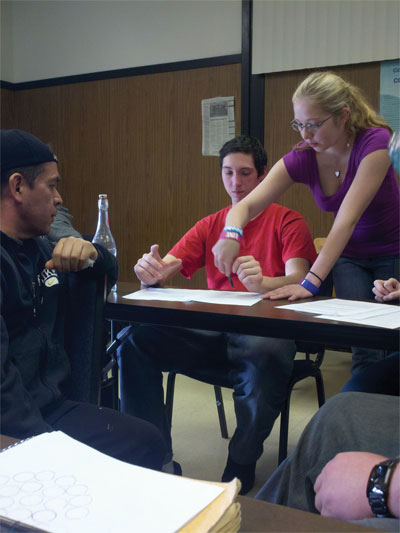
Students Practice Social Justice and Service Learning
As a Communications Studies class assignment, a group of UCC students recently put together a turkey dinner for homeless people in the community.
During the planning stages, they had big ideas on how they would accomplish their goal. They managed to collect food donations, arrange a location to have the dinner, cook, serve and clean up.
The project was going smoothly until they realized that they had no one to serve dinner to. Another group was collecting winter coats for the homeless. The two groups combined efforts and put together an event that touched more than 60 lives.
Projects like this are called service learning. They apply students’ knowledge and skills to serve the community.
Across the country, other colleges are taking these projects to the next level.
Found mostly in liberal arts colleges, service learning project topics are beginning to lean toward social justice.
Social justice is the idea of creating a society or institution that is based on the principles of equality and solidarity, that understands and values human rights. They also recognize the dignity of every human being.
Colleges across the country are beginning to incorporate social justice into their curriculum. Brandeis University in Massachusetts and Lake Forest College in Illinois offer minors in social justice. Whitman College in Washington and Philander Smith in Arkansas both have programs in place for social justice as well.
UC Berkeley recently handed out $125,000 to fund student social justice projects aimed at building social bridges on their campus. One project involved bringing Muslim and Jewish students together to share a meal and discuss social justice issues.
The projects, whether service or social justice, can be impactful. “I think those who participate in well-developed and executed projects typically experience a sense of accomplishment and empowerment,” said Paula Usrey, UCC Communications Studies instructor.
These hands-on assignments engage students differently. Service learning gives students the opportunity to apply in the community what they learn in the classroom.
The community gains just as much satisfaction out of these projects as the students do. “In some cases,” said Usrey, “representatives from an organization or group have expressed deep gratitude and appreciation for the work students have done.”
Not all group projects go exactly as planned. “Service learning is a messy undertaking,” said Usrey. This is a good experience for students to use problem solving and critical thinking skills. They learn to demonstrate leadership, cooperation and innovation.
| The Mainstream is a student publication of Umpqua Community College. | About us | Advertising | Archives |
